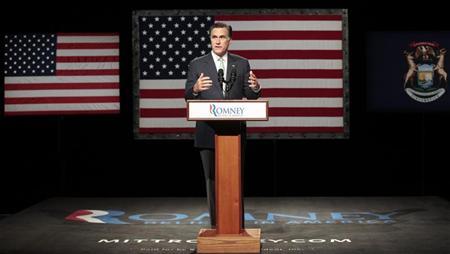(Reuters) – There are not many Mitt Romney fan clubs at Liberty
University.

U.S. Republican presidential candidate and former Massachusetts governor, addresses a crowd of
supporters during a rally at Lansing Community College in Lansing, Michigan May 8, 2012.
REUTERS/Rebecca Cook
The Lynchburg, Virginia, school, founded by the late
television evangelist Jerry Falwell, is a bastion for conservative Christian thought. Its theology
students are taught that Mormonism – Romney’s religion – is a cult.
So for Romney, giving the
commencement speech at Liberty on Saturday is a chance to make a heart-to-heart appeal to evangelical
Christians who are skeptical of his Mormon faith and conservative credentials.
But more likely,
the presumptive Republican presidential nominee will use his commencement address at Liberty on
Saturday to try to show evangelicals that he and they have much in common.
The announcement last
month that Romney would speak at Liberty caused an uproar. University officials took down a
commencement Facebook page after it was flooded with hundreds of posts objecting to Romney’s
appearance.
“I would not want to end my studies at a Christian university by being sent into the
world at commencement by a Mormon,” Liberty student Sarah Misch told CNN last month.
Beyond its
potential as a walk-into-the-lion’s-den moment, Saturday’s speech gives Romney a unique opportunity
to reach out to conservative Christians, whom he often has struggled to impress during the
campaign.
The speech comes three days after Romney’s opponent in the November 6 election,
Democratic President Barack Obama, declared his support for same-sex marriage. That gives Romney, who
opposes gay marriage, a potentially strong talking point in trying to bond with his conservative
audience at Liberty.
So how will Romney play it?
Romney’s campaign said in a briefing on
Friday that during his speech, Romney would call marriage “an enduring institution that should be
defended,” but that the speech would otherwise not be political.
The speech, a day before
Mother’s Day, will emphasize the importance of family, along with his familiar campaign theme of the
need for a better strategy on jobs and the economy.
“The best cultural assets are values as
basic as personal responsibility, the dignity of hard work, and, above all, the commitments of family,”
according to an excerpt of the speech released by Romney’s campaign on Friday.
“Take those
away, or take them for granted, and so many things can go wrong in a life. Keep them strong, and so
many things will go right.”
AVOID RELIGION?
In short, Romney – who mostly treated
Obama’s announcement on gay marriage as a distraction – will continue doing so.
Political
strategists say it is probably a good idea to keep religion out of his speech.
“He’s not going
there to give a theological speech to the students,” said Alice Stewart, an aide to Republican Rick
Santorum, who challenged Romney for the party’s presidential nomination.
Republican strategist
Ron Christie said that just by accepting the invitation to address Liberty graduates, Romney was trying
to reach out to conservative evangelicals wary of his moderate record as governor of Massachusetts from
2003 to 2007.
“I think Southern evangelicals will appreciate Governor Romney’s outreach to
them,” Christie said. “It would have been easier for Romney to cite scheduling issues to delay such a
visit. I predict a more favorable than expected reception.”
Christie’s prediction echoed
statements by Liberty Chancellor Jerry Falwell Jr., son of the university’s Southern Baptist founder,
who died in 2007.
The younger Falwell has cited Romney’s appearance as an example of Liberty’s
tolerance for views that do not necessarily fall in line with the university’s doctrine.
To
students protesting Romney’s commencement invitation, Falwell recently wrote a letter saying, “When my
father traveled the nation speaking at many secular universities, he was often met with boos and hisses
by those who held different theological beliefs.
“I am so proud that Liberty students have
gained a reputation for treating those whose beliefs are different than their own in a Christ-like
manner,” he wrote, citing appearances at Liberty by the late liberal Democratic U.S. Senator Edward
Kennedy, among others.
DEFEATING OBAMA
Even so, the idea of Romney giving graduates their
send-off from Liberty has not gone over well with some students at the university, where Mormonism is
considered to be a skewed form of Christianity.
“I can’t support Romney and I am happy I
decided not to (attend commencement) this year,” one Liberty student wrote on the graduation Facebook
page before it was taken down. “Liberty University should have gotten a Christian to speak, not someone
who practices a cult. Shame on you Liberty University.”
Others were more favorable.
A
poster to the page identified as Kathy Creech said, “I, for one, am pleased that the future president
of the United States will be speaking there!”
Some Republican strategists said that however
successful his speech at Liberty, Romney would generate enthusiasm among conservative Christians only
if they become convinced he can do one thing: defeat Obama.
Such voters typically lean
Republican and, if they are engaged in the election, could give Romney a significant boost in
politically divided states such as Virginia and North Carolina that will be especially important on
November 6.
“Social and religious conservatives are behind Romney, albeit reluctantly,”
Republican strategist Juleanna Glover said. “If they think Romney can beat Obama, they will become far
more enthused.”
(Editing by David
Lindsey and Peter
Cooney)





